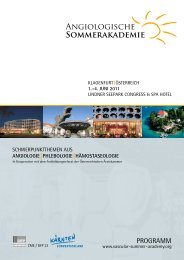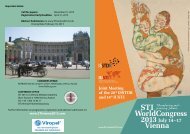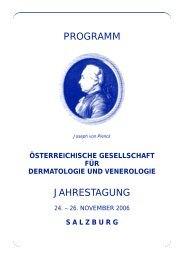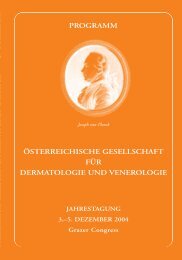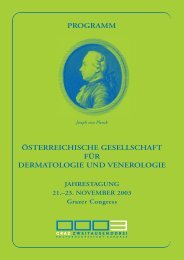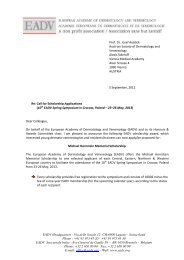PROGRAMM JAHRESTAGUNG 2012 30. Nov. – 2. Dez ... - ÖGDV
PROGRAMM JAHRESTAGUNG 2012 30. Nov. – 2. Dez ... - ÖGDV
PROGRAMM JAHRESTAGUNG 2012 30. Nov. – 2. Dez ... - ÖGDV
Sie wollen auch ein ePaper? Erhöhen Sie die Reichweite Ihrer Titel.
YUMPU macht aus Druck-PDFs automatisch weboptimierte ePaper, die Google liebt.
Poster Tumore der Haut<br />
P 47<br />
Extranodal nasal-type natural killer/T-cell lymphoma mimicking refractory<br />
sinusitis in a 60-year-old man<br />
Werner Nindl 1<br />
Hansgeorg Müller 1<br />
Bernhard Zelger 1<br />
Wolfgang Willenbacher 2<br />
Lorenzo Cerroni 3<br />
Matthias Schmuth 1<br />
1 Universitätsklinik für Dermatologie Innsbruck, Anichstraße 35, 6020 Innsbruck<br />
2 Department of Hematology and Oncology, Innsbruck Medical University, Innsbruck<br />
3 Research Unit of Dermatopathology, Department of Dermatology, Medical University<br />
of Graz, Graz<br />
Introduction: Extranodal NK/T-cell lymphoma, nasal type, is an aggressive<br />
non-Hodgkin's lymphoma subtype originating from peripheral T-cells or natural killer<br />
(NK) cells. Due to its rarity in European countries, the diagnosis is often missed at initial<br />
presentation, with its nonspecific symptoms misattributed to more common chronic<br />
diseases.<br />
Methods and Results: We report a 60-year-old white man who presented with<br />
uncontrollable acute exacerbation of chronic sinusitis despite antibiotic therapy for 3<br />
months. Physical examination showed left-sided nasal deviation and obstruction, and<br />
a diffuse swelling of the paranasal soft tissue. Imaging (CT, MRI) revealed no evidence<br />
of bone damage. The patient underwent endoscopic sinus surgery along with<br />
septoplasty that was followed by a revision surgery within one month due to<br />
persistence of symptoms. Histological examination of the resected tissue showed nonspecific<br />
features of chronic inflammation. MRI and a repeated intranasal biopsy showed<br />
no evidence of malignancy. No long-term clinical improvement but the occurrence of<br />
nasal skin necrosis was observed under immunosuppressive therapy (Anakinra, Tocilizumab,<br />
methylprednisolone). Histological assessment of a cutaneous excisional biopsy<br />
demonstrated a lymphoid infiltrate (CD3Îμ+, CD56+, TIA-1+, Granzyme-B+, EBER-ISH+)<br />
comprising small- to medium-sized cells with irregular nuclei. 18F-FDG PET scan and<br />
bone marrow examination showed no further involvement (stage IE). The International<br />
Prognostic Index (IPI) was low risk (1 point; LDH 381 U/L). Initial therapy for this locally<br />
advanced nasal-type NK/T-cell lymphoma consisted of alemtuzumab plus CHOP<br />
chemotherapy and palliative plastic surgery of the destructed nasal tissue. Since no<br />
clinical response was observed after 5 cycles of chemotherapy, a first salvage<br />
chemotherapy with DHAP and radiotherapy were done. After a local recurrence<br />
involving the left orbita, two cycles of SMILE chemotherapy induced a complete<br />
remission on PET/CT. The patient subsequently underwent autologous stem cell<br />
transplantation.<br />
Conclusion: Recalcitrant chronic sinusitis may be the initial presentation of nasal-type<br />
NK/T-cell lymphoma. A high index of suspicion, performance of repeat biopsies, and<br />
careful histological examination are crucial to prevent a delay in diagnosis.<br />
104




